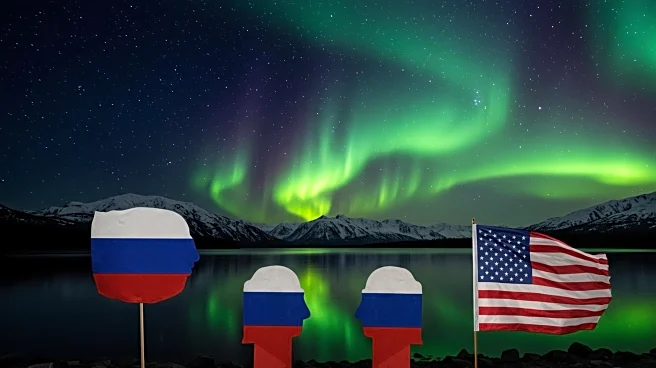What's Happening?
Alaskans are preparing for a significant meeting between Russian and U.S. officials, with President Vladimir Putin visiting Anchorage. The meeting is set to take place at Joint Base Elmendorf-Richardson, focusing primarily on Russia's ongoing war in Ukraine. The visit has stirred mixed emotions among locals, with some expressing concern over potential discussions about Alaska's historical ties to Russia. Vendor Mike Bialy, operating near the base, hopes for smooth proceedings, while others like Lou Baker see the event as an opportunity for Anchorage to gain international attention. Former Anchorage Mayor Rick Mystrom recalls past positive relations with Russian citizens but remains critical of Putin's leadership. Some residents plan to protest, highlighting their opposition to Russian aggression, while others, like Bill Gallanger, caution against antagonizing a nuclear power.
Why It's Important?
The meeting in Alaska underscores the geopolitical tensions between the U.S. and Russia, particularly regarding the conflict in Ukraine. Alaska's proximity to Russia and its historical ties add layers of complexity to the visit. The event could influence U.S.-Russia relations, potentially affecting diplomatic strategies and international policies. Local reactions reflect broader sentiments about global politics, with some residents advocating for peace and others emphasizing the importance of standing against aggression. The visit also highlights Alaska's strategic significance in U.S. defense and international diplomacy.
What's Next?
As the meeting unfolds, potential outcomes could include discussions on peace agreements or treaties, impacting future diplomatic relations. Local protests may draw attention to public sentiment against Russian policies, influencing political discourse. The event may also prompt further dialogue on Alaska's role in international affairs, given its historical and strategic importance. Stakeholders, including political leaders and civil society groups, will likely monitor developments closely, assessing implications for U.S. foreign policy and regional security.
Beyond the Headlines
The visit raises ethical questions about engaging with leaders accused of human rights violations, as highlighted by Rick Mystrom's criticism of Putin. It also reflects cultural dimensions, with Alaskans balancing historical connections to Russia against contemporary geopolitical realities. Long-term shifts could include increased scrutiny of U.S.-Russia relations and Alaska's role in global diplomacy, potentially influencing future policy decisions.











